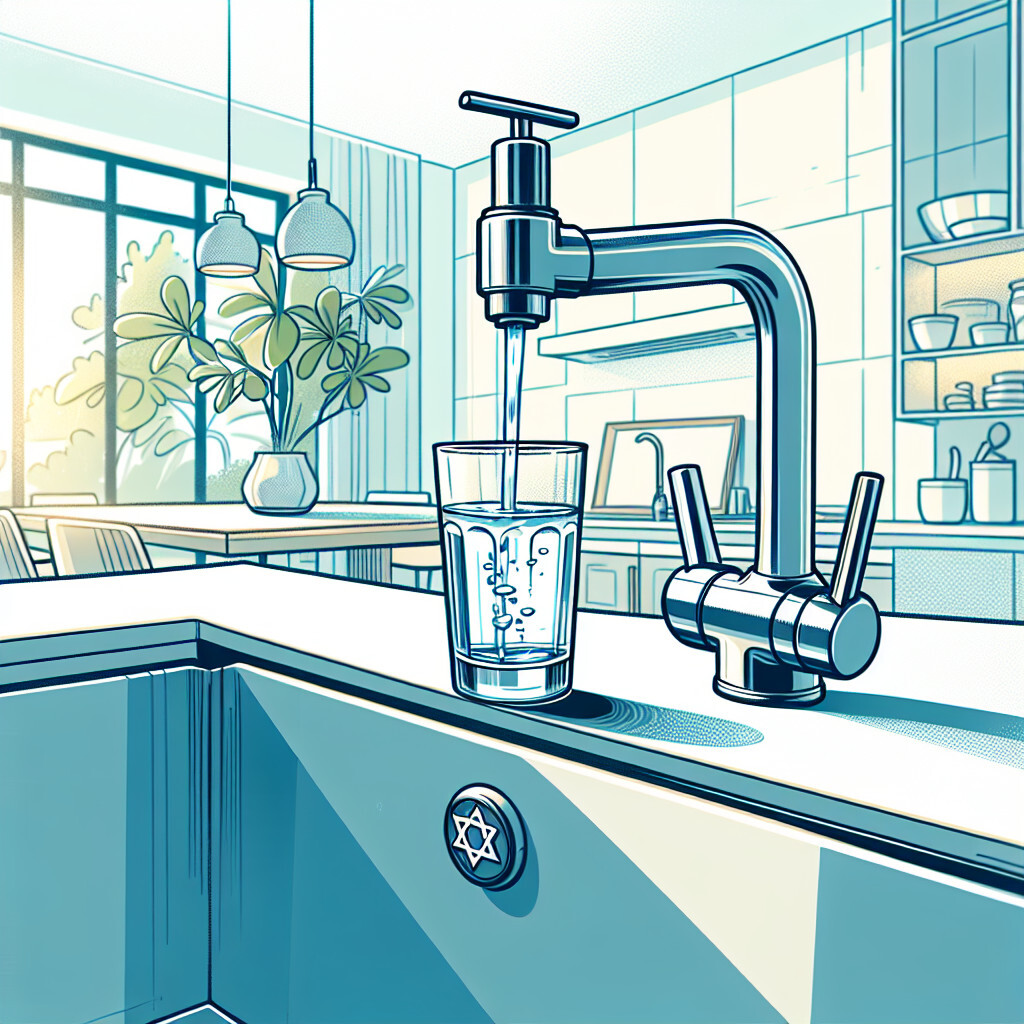-
Table of Contents
“Israel’s Tap Water: Purity and Innovation in Every Drop.”
Introduction

Israel is renowned for its advanced water management system, making its tap water generally safe and clean to drink. The country’s arid climate and scarce water resources have led to the development of innovative solutions, including desalination, recycling, and water conservation. Despite the high quality, some may notice a different taste due to the minerals added during the desalination process. Therefore, while the tap water in Israel meets health standards, some people may prefer to drink bottled water due to personal taste preferences.
Understanding the Quality of Tap Water in Israel
Israel, a country located in the arid region of the Middle East, has long grappled with water scarcity. However, it has managed to turn this challenge into an opportunity by developing innovative water technologies and management strategies. One of the most significant achievements of Israel in this regard is the provision of high-quality tap water to its residents.
The quality of tap water in Israel is generally excellent, thanks to the country’s advanced water treatment and desalination processes. Israel is a world leader in desalination, a process that removes salt and other impurities from seawater, making it safe for human consumption. The country’s largest desalination plant, located in Sorek, produces around 20% of the country’s domestic water supply.
The tap water in Israel undergoes rigorous testing to ensure it meets the stringent standards set by the Ministry of Health. These standards are based on the World Health Organization’s guidelines for drinking water quality. The water is tested for a variety of parameters, including pH, turbidity, and the presence of harmful bacteria and chemicals. The results of these tests are publicly available, providing transparency and reassurance to consumers about the safety of their tap water.
In addition to desalination, Israel also uses advanced wastewater treatment technologies to augment its water supply. Nearly 90% of the wastewater generated in the country is treated and reused for agricultural irrigation, the highest rate in the world. This not only conserves precious freshwater resources but also reduces the environmental impact of wastewater discharge.
Despite the high quality of tap water in Israel, some residents prefer to drink bottled water or use water filters at home. This is often due to personal taste preferences or concerns about the presence of chlorine, which is used to disinfect the water. While the level of chlorine in Israeli tap water is safe for consumption, it can affect the taste and smell of the water.
It’s also worth noting that the quality of tap water can vary slightly from one region to another in Israel. This is due to differences in the source of the water and the local water treatment processes. For instance, tap water in coastal areas is primarily sourced from desalination plants, while in other regions, it may come from natural freshwater sources like the Sea of Galilee.
In conclusion, the tap water in Israel is of high quality and safe to drink, thanks to the country’s advanced water treatment and desalination technologies. However, taste preferences and regional variations may influence individual decisions to drink tap water, use filters, or opt for bottled water. As a visitor or resident in Israel, you can confidently consume the tap water, but if you have specific taste preferences or sensitivities, you might want to consider using a water filter or drinking bottled water. Regardless, Israel’s success in providing clean, safe tap water in a region characterized by water scarcity is a testament to its innovative spirit and commitment to sustainable water management.
The Science Behind Israel’s Tap Water Purification Process
Israel, a country located in the arid region of the Middle East, has been lauded globally for its innovative approach to water management, particularly in the area of tap water purification. Despite its geographical location and climatic conditions, which are not conducive to abundant water supply, Israel has managed to provide its citizens with a steady supply of clean, safe, and potable tap water. This achievement is largely due to the country’s advanced water purification process, which is rooted in scientific innovation and technological advancement.
The tap water in Israel undergoes a rigorous purification process before it reaches the taps of households and businesses. The process begins with the collection of water from various sources, including underground wells, rivers, and the Sea of Galilee. This water is then transported to treatment plants where it undergoes several stages of purification. The first stage involves the removal of large particles and debris through a process known as sedimentation. The water is then subjected to coagulation and flocculation, where chemicals are added to the water to bind smaller particles together, making them easier to remove.
Following this, the water undergoes filtration, where it is passed through layers of sand and gravel to remove any remaining particles. The water is then disinfected to kill any remaining bacteria, viruses, and other microorganisms. This is typically done using chlorine, although other methods such as ultraviolet light or ozone may also be used. The water is then tested to ensure it meets the required safety standards before it is distributed to consumers.
One of the key factors that set Israel apart in terms of water management is its use of desalination technology. Given its location along the Mediterranean Sea, Israel has capitalized on this resource by developing advanced desalination plants that convert seawater into fresh, potable water. This process involves removing the salt and other minerals from the seawater through a process known as reverse osmosis. The water is then treated and disinfected before it is added to the country’s water supply.
In addition to desalination, Israel also utilizes wastewater recycling as part of its water management strategy. In fact, Israel leads the world in wastewater recycling, with approximately 85% of its wastewater being treated and reused for agricultural irrigation. This not only provides a sustainable source of water for agriculture but also reduces the demand for fresh water.
The science behind Israel’s tap water purification process is a testament to the country’s commitment to overcoming its geographical and climatic challenges to ensure a steady supply of clean, safe water for its citizens. Through a combination of traditional water treatment methods, advanced desalination technology, and innovative wastewater recycling, Israel has managed to turn its water scarcity problem into a story of success.
In conclusion, the tap water in Israel is not only safe for consumption but is also a product of scientific innovation and technological advancement. The country’s rigorous purification process, coupled with its use of desalination and wastewater recycling, serves as a model for other countries facing similar water scarcity challenges.
Health Implications of Drinking Tap Water in Israel
Israel, a country known for its technological advancements and innovative solutions, has made significant strides in the field of water management. This is particularly evident in the quality of its tap water, which is not only safe to drink but also meets the highest international standards. However, the health implications of drinking tap water in Israel are a topic of interest for both residents and tourists alike.
The quality of tap water in Israel is primarily attributed to the country’s advanced water treatment processes. Israel is a global leader in desalination and wastewater treatment technologies, which play a crucial role in ensuring the safety and potability of its tap water. The country’s desalination plants, for instance, remove salt and other impurities from seawater, transforming it into fresh water suitable for human consumption. Similarly, Israel’s wastewater treatment facilities effectively eliminate harmful substances and pathogens, thereby reducing the risk of waterborne diseases.
Moreover, the Israeli Ministry of Health regularly monitors the quality of tap water across the country. This involves conducting rigorous tests to check for the presence of harmful chemicals, heavy metals, and microbial contaminants. The results of these tests are made public, providing transparency and reassurance about the safety of the tap water. In fact, the World Health Organization has consistently rated Israel’s tap water as being of high quality, further attesting to its safety.
Despite these assurances, some individuals may still experience minor health issues after drinking tap water in Israel. This is often due to the difference in mineral content compared to the water they are accustomed to. For instance, tap water in Israel is typically hard, meaning it has a high mineral content, particularly calcium and magnesium. While these minerals are not harmful and can even contribute to a healthy diet, they can sometimes cause minor digestive discomfort in individuals not used to drinking hard water.
Furthermore, the chlorine used to disinfect the water can sometimes give it an unpleasant taste or smell. While this does not pose a health risk, it can be off-putting for some individuals. To overcome this, many Israelis opt to use water filters or drink bottled water. However, it’s worth noting that the use of plastic bottles has significant environmental implications, and the quality of bottled water is not necessarily superior to that of tap water.
In conclusion, the tap water in Israel is safe to drink and meets international standards for water quality. The country’s advanced water treatment processes, coupled with regular monitoring by the Ministry of Health, ensure the safety and potability of the tap water. While the hard water and the presence of chlorine may cause minor discomfort for some, these are not health risks. Therefore, whether you’re a resident or a visitor, you can confidently drink the tap water in Israel, knowing that it is not only safe but also contributes to the country’s sustainable water management efforts.
The Role of Desalination in Providing Tap Water in Israel
Israel, a country located in the arid region of the Middle East, has long grappled with water scarcity. However, it has managed to overcome this challenge through innovative solutions, one of which is desalination. This process, which involves removing salt and other impurities from seawater to make it suitable for human consumption and irrigation, plays a crucial role in providing tap water in Israel.
The country’s reliance on desalination can be traced back to the 1960s when it began exploring ways to address its water shortage. The scarcity of freshwater sources, coupled with the increasing demand due to population growth and agricultural needs, necessitated the search for alternative water sources. Consequently, Israel turned to the Mediterranean Sea, which offered an abundant, albeit saline, water source.
The first desalination plant was established in Eilat in 1965, marking the beginning of Israel’s journey towards water self-sufficiency. Over the years, the country has built several more desalination plants along its coastline. Today, Israel boasts five major desalination facilities, which together produce about 600 million cubic meters of water annually. Remarkably, this accounts for nearly 80% of the country’s domestic water consumption, underscoring the critical role of desalination in providing tap water in Israel.
The desalination process employed in Israel is primarily reverse osmosis, a technique that forces seawater through a semi-permeable membrane to separate the salt and other impurities. This method is favored for its efficiency and the high quality of water it produces. The desalinated water is then blended with natural freshwater to achieve the desired taste and mineral content before being supplied to households and businesses.
The quality of tap water in Israel is a testament to the effectiveness of desalination. According to the Israel Water Authority, the country’s tap water meets all the health and quality standards set by the World Health Organization. This means that the tap water in Israel is not only safe to drink but also ranks among the best in the world in terms of quality.
However, the reliance on desalination is not without its challenges. The process is energy-intensive, contributing to greenhouse gas emissions. It also produces brine, a byproduct that can harm marine life if not properly managed. To mitigate these impacts, Israel is investing in renewable energy to power its desalination plants and exploring ways to utilize the brine, such as in the production of salt and other minerals.
In conclusion, desalination plays a pivotal role in providing tap water in Israel. It has enabled the country to overcome its water scarcity, ensuring a reliable supply of high-quality water for its population. Despite the environmental challenges associated with desalination, Israel continues to invest in this technology, demonstrating its commitment to securing its water future. As such, the story of tap water in Israel is one of innovation and resilience, offering valuable lessons for other arid regions grappling with water scarcity.
Q&A
1. Question: Is tap water in Israel safe to drink?
Answer: Yes, tap water in Israel is generally safe to drink as it undergoes thorough treatment processes.
2. Question: What is the source of tap water in Israel?
Answer: The primary sources of tap water in Israel are the Sea of Galilee, the Coastal Aquifer, and desalinated seawater.
3. Question: Does the tap water in Israel taste good?
Answer: The taste of tap water can vary depending on the region in Israel. Some people may find it slightly salty due to the desalination process.
4. Question: Are there any concerns about the tap water in Israel?
Answer: While the tap water is generally safe to drink, some areas may have older pipes which can affect the water quality. Additionally, the high mineral content due to desalination can be a concern for some people.
Conclusion
The tap water in Israel is generally safe to drink, meeting high international standards for potable water. However, taste can vary depending on the region due to different sources of water and treatment methods.






